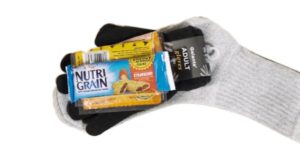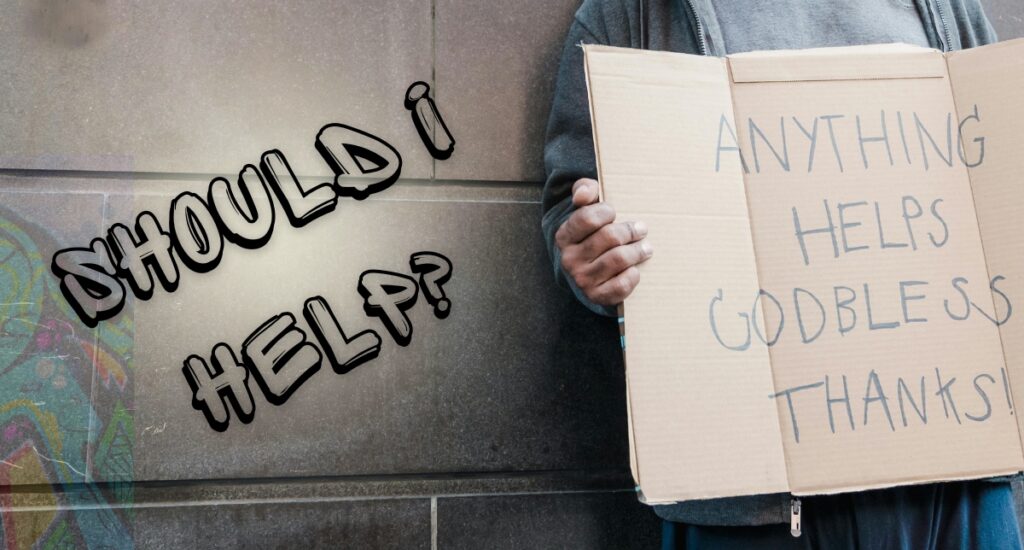It’s a challenging question with no one-size-fits-all answer. During those thirty seconds at a traffic light, many thoughts may run through your mind: “This young guy seems capable; why doesn’t he get a job?” “Poor woman, out here with a baby on such a freezing day.” “This man looks frightening; maybe he’s on drugs—I shouldn’t make eye contact.”
These thoughts can lead us to feel judgmental, conflicted, and with a range of emotions: sadness, anger, compassion, or, most commonly, discomfort.
So, what can we do?
While we might not be able to solve their problems at that moment, we can always choose to acknowledge their humanity. Regardless of the circumstances that led that person to their current situation, they deserve the same love and respect as anyone else. This acknowledgment is a powerful act of compassion, reminding them of their inherent dignity. I try to remember that Jesus Christ gave His life for that person in the corner just as much as He did for me.
After years of speaking with people living on the streets and developing genuine friendships with them, we at Christ in the City have come to understand that homelessness is often rooted in broken relationships. Alongside their material poverty and many struggles, they suffer from an invisible and devastating poverty: the poverty of loneliness.
So let me offer some practical tips for the next time you see a homeless person at a traffic light:
The Basics
- Try to stop your thoughts from attempting to understand or judge their predicament.
- Realize that your task in the next 30 seconds is not to fix their problems or make them change their lives.
- Just acknowledge their dignity by looking at them and offering a smile. This simple gesture can break through the isolation people experiencing homelessness feel daily.
- Since they are not invisible, look at them and give a friendly wave with your hand.
The Next Level
- Keep a few items in your car, like socks, soft foods, or a bottle of water. You can hold them together with clear bags or rubber bands.
- When possible, and if you feel safe, lower your window and say “hello.” Share your name and ask for theirs. “Hello, how are you doing? I’m Eduardo. What’s your name?”
- If you have something in your car that you would like to give, this is the time to say something like: “Very nice to meet you, Tom, I hope your day is not going too bad, would you like a bottle of water?”
- If at the moment you feel moved to give some money, do it. Personally, I feel moved to do it when I see a mom, with her children nearby, holding a cardboard sign saying: “Anything Helps.”
- However, always remember that most of the time, the short and friendly relationship you establish with them is more important than the $5 bill.

Going a Step Further
- Again, if you feel safe, reach out and offer a handshake while saying your name. This simple gesture breaks a barrier and expresses that you recognize their dignity.
- You only have a few seconds before the light turns green! Use that time for a friendly conversation.
- Offer to pray for them and mean it.
- As you drive away, say a quick prayer for that person. The best thing you can do for now is to place their well-being in God’s hands.
If you often travel the same route, you might see the same person again. Remember their name and greet them by it next time: “Hi, Tom, great to see you again!”
I can assure you that after a few interactions, that person will approach your car with a smile like yours. You might have just given them their only smile of the day—a small spark that could ignite hope. And hope, with God’s grace, is the most powerful motivation to begin a journey of healing and recovery.
Sometimes, these tips won’t work. The person might be having a bad day or going through serious problems. If you don’t get a kind answer in return or even get rejected, just be happy that out of your generosity, you took upon yourself the awkwardness of trying to make their day better. Even if it doesn’t seem to, you probably did.
